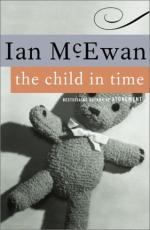|
This section contains 6,435 words (approx. 22 pages at 300 words per page) |

|
SOURCE: Edwards, Paul. “Time, Romanticism, Modernism and Moderation in Ian McEwan's The Child in Time.” English 44, no. 178 (spring 1995): 41-55.
In the following essay, Edwards considers McEwan's evocation of Romantic and Modernist conceptions of time, experience, and natural order in The Child in Time, especially as such motifs underscore the novel's literary critique of British social and political reality.
Ian McEwan's The Child in Time tells the story of a couple whose lives (and marriage, it would seem) have been blighted by the abduction of their child, and depicts an England which has been blighted by a government even more ‘Thatcherite’ than that which was in power at the time of the novel's first publication.1 The blights are not unconnected, and the governmental attitude towards children, child-rearing and education continually emerge into the foreground of the novel. Each chapter is prefaced by an epigraph supposedly taken from the government-issued...
|
This section contains 6,435 words (approx. 22 pages at 300 words per page) |

|


